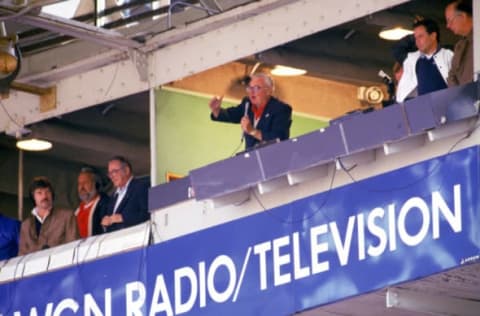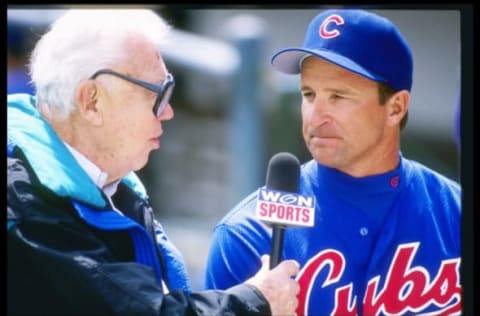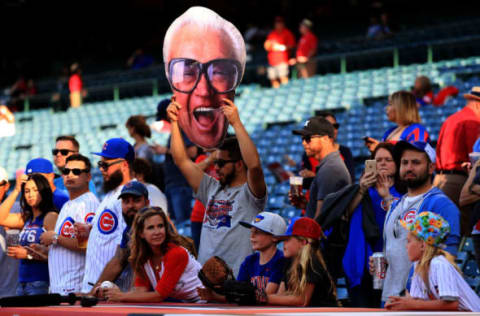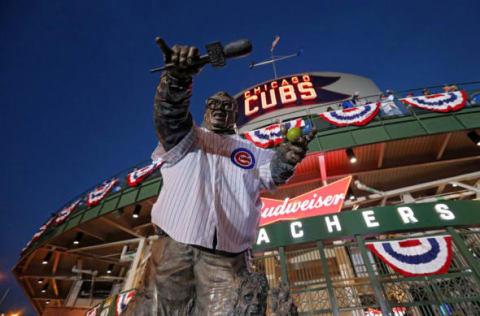Chicago Cubs: The Heroes of Wrigley Series presents Harry Caray


Even after more than 20 years since his passing, the great announcer’s legacy lives on at every home game at Wrigley Field and in the hearts of every fan.
While Harry Caray began his broadcasting career that spanned 52 years, covering five Major League Baseball clubs, he is undoubtedly most synonymous with the Chicago Cubs.
From 1982 all the way up until his final season in 1997, the immensely beloved Caray could be heard calling every Cubs game on WGN.
Caray himself was a talented baseball player and a standout and was even offered an opportunity to play at the University of Alabama. In the midst of World War II, Caray declined to attend the college to help serve his country, enlisting in the Armed Forces.
However, due to his poor eyesight, he was denied. Wanted to stay close to the game he loved the most, Caray began to pursue a career in broadcasting and landed a job with the St. Louis Cardinals in 1945.
More from Cubbies Crib
- Cubs: Adrian Sampson is forcing his way into the conversation
- Projecting the Chicago Cubs bullpen to open the 2023 season
- Cubs fans are beginning to see the light at the end of the tunnel
- Justin Steele has evolved into a frontline starter for the Cubs
- The future of first base is murky right now for the Cubs
Also briefly calling games for St. Louis Browns and St. Louis Flyers, the city’s hockey team, Caray enjoyed a near 25 career calling games for the Redbirds, which included three World Series (1964, 1967-68) with fellow Hall of Famer, Jack Buck.
Caray was nearly killed after being struck by a car while crossing the street which resulted in him suffering two broken legs in November 1968. He returned for Opening Day in 1969 and, in classic Harry fashion, emphatically threw his two canes aside, walking across the field on his own accord to astounding cheers from the St. Louis crowd at Busch Stadium II.
Caray’s car accident has been long speculated to be linked to his rumored affair with Anheuser-Busch’s CEO and Cardinals President, Gussie Bush’s daughter-in-law.
Bush declined to renew Caray’s contract after the ’69 season, tossing aside the rumors of an affair and citing a recommendation from Anheuser–Busch’s marketing department after Caray was seen drinking a can of Schlitz beer at a press conference.
His time with the Cardinals’ organization had come to an end after 25 years. At that time, he was the longest tenured broadcaster in baseball.
He made a brief stop in Oakland for 1970 season as the broadcaster of the Athletics, but that marriage lasted only one season. Caray claimed that A’s owner Charles O. Finley and longtime announcer Monte Moore didn’t appreciate his free-wheeling, improvised approach to calling games and was a direct result of his one-and-done lone season in Oakland.

Harry Caray begins a career on the South Side of Chicago, starting traditions that live on till this day.
Caray fit right in with his new home in Chicago, joining the White Sox booth the following season in 1971.
The fans loved him and became very popular with his jovial behavior amongst the masses of South Siders often being critical of the blunders committed by the hometown team. While the fans adored him, players weren’t always too keen to his criticism.
A dubious highlight from his time on the South Side came on July 12, 1979, for which is now known as “Disco Demolition Night.” In an effort to sell seats during a doubleheader between the White Sox and Detriot Tigers, the team enlisted the promotional help of local DJ Steve Dahl. Dahl insisted fans bring their disco vinyl into Comiskey which then would be blown up in a crate located in center field following the end of the first game.
The sold-out crowd went into a frenzy while the demolishing. Rushing the field and Comiskey entered a state of anarchy and despite Caray’s and his also popular tandem mate, Jimmy Piersall’s best efforts to ease the crowd’s chaos. The Chicago Riot Police were forced to clear the field, resulting in the White Sox forfeiting the second game due to the extensive damage caused to the field.
Caray would work for the White Sox until the end of the 1981 season. It was then where his legacy would truly begin and be remembered forever as just “Harry.”

Harry finds his permanent home, a place where his fun-loving, gregarious behavior will be welcomed and championed forever.
Harry Caray stayed in Chicago to the renown of the fans, joining the North Side Cubs ahead of the 1982 season. While Harry’s popularity in Chicago was already cemented, the Cubs’ television outlet, WGN-TV, was broadcast nationwide resulting in his popularity to be increased all over through the United States.
Harry became the perfect successor for another beloved long-time Cubs announcer, Jack Brickhouse, who was a staple for the organization from 1941-45 and again from 1948-81. Brickhouse, an Illinois native, was a fixture for all of Chicago’s major sports, calling games for the White Sox (1940-45, 1948-67), the Bears (1953-77), and the Bulls (1966-73).
Needless to say, Harry had extremely big shoes to fill but proved he was the man to take on Jack’s mantle.
By 1984, the Cubs had won the National League East division title, and Harry’s popularity soared even higher than ever. His habitual seventh-inning stretch rendition of “Take Me Out to the Ball Game,” which he had started while with the White Sox, became a beloved tradition at Wrigley Field as he coerced the fans to join him in loudly belting (and slurring) the tune every game. A now cult-like figure in Chicago, fans began to even don their own thick, black barrel-rimmed glasses in homage to Harry.
Along with his immense popularity, which never faded, neither did Harry’s love for beer. Known for enjoying “a few” of his favorite Budweiser’s a game, Harry was nicknamed “The Mayor of Rush Street,” a reference the Chicago’s famed neighborhood which held a plethora of famous tavern and bars littered throughout the area.
After suffering a stroke in 1987, Harry’s health began to fade. Despite being past WGN’s usual mandatory retirement age, the network allowed him to continue, a testament to his popularity and status in Chicago.
However, due to his health, Harry was limited to home games and only road trips to surrounding areas such as Milwaukee and St. Louis.
Harry soldiered on, despite his poor health, bringing the Wrigley fans as well as the millions watching on television nationwide, the most entertaining broadcasting baseball fans could ask for.
One of my personal favorites is Harry’s constant pursuit in trying to pronounce Montreal Expos (and future Cubs) second baseman, Mark Grudzielanek‘s name.
While the Cubs were often in long stretches of futility, Harry would still manage to find a way to entertain the fans, even attempting to say Grudzielanek’s name backwards in order to make us briefly forget the team was mathematically eliminated by late May.
It was one of the many reasons why we loved Harry Caray.

The spirit of Harry Caray lives on in Wrigley Field lore and his presence is still felt there today.
Harry’s grandson, Chip Caray, was hired to share the booth his famous grandfather before the start of the 1998 season. Sadly, the tandem would never call a game at Wrigley together as Harry passed away in February ’98 at the age of 83.
The Cubs organization and the Wrigley faithful mourned the death of their beloved announcer ahead of their memorable 1998 campaign.
The ’98 season would be dedicated to Harry, as the team wore caricature patches on their sleeves. As the ultimate nod to Harry, the Cubs won the National League wildcard in Game 163 against the San Francisco Giants, clinching their first playoff birth in nearly a decade.
Sammy Sosa, in his historic 66 homerun season, dedicated each home run to Harry during the famous chase of Roger Maris‘ record between him and Mark McGwire that year.
While Harry’s absence from the booth was missed, his grandson Chip carried his legacy into the new year. Continuing his grandfather’s seventh-inning stretch tradition, Chip became the first person to lead the Wrigley crowd in singing “Take Me Out to the Ballgame.” The tradition has lived ever since in dedication to Harry, as a guest conductor leads the tune during every Wrigley Field home game.
Tearfully, during Game 5 of the 2016 World Series, I watched Pearl Jam frontman, Eddie Vedder lead the last rendition of the ’16 season at Wrigley Field. The Cubs were down 3-1 in the series and with archive footage of Harry joining the grunge star, Vedder let Harry take the reigns once more.
The Cubs eventually won that final game at Wrigley, as well as the remaining two in Cleveland to capture their first World Series Championship in 108 years and I like to think that Harry was the turning point we needed to start the historic comeback and finally win it all.
Harry Caray’s legacy with forever live on within the lore of the Chicago Cubs and will never be forgotten. Along with his seventh-inning stretch tradition, we can always look up towards the heavens, past the Wrigley Field green, and see his “Holy Cow” home run call forever stamped on the yellow foul pole.
Cubs eager to put disappointment behind them. dark. Next
He has become a pop-culture figure with fans donning Harry Caray glasses at games, Ryan Dempster‘s hilarious impressions over the years at Cubs games and conventions, and of course, Second City alum Will Ferrell’s impersonation of the Cub great on Saturday Night Live.
Despite having left us 21 years ago, Harry’s presence is still felt during every Chicago Cubs game which is why he is the perfect person to be anointed the first non-player “Hero of Wrigley” in the series.